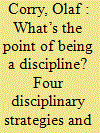|
|
|
Sort Order |
|
|
|
Items / Page
|
|
|
|
|
|
|
| Srl | Item |
| 1 |
ID:
134378


|
|
|
|
|
| Summary/Abstract |
While the rise of “resilience” as a strategic concept has been widely noted, critical security scholars have given it a frosty reception, viewing it as a vehicle and multiplier of neo-liberal governmentality. This article acknowledges that resilience does form part of a neo-liberal security regime, but argues that a shift from defense to resilience is not devoid of critical potential, and develops recent calls for critique to be made more context specific. It begins by arguing that blanket condemnation of resilience is part of a wider tendency to apply Foucault's “governmentality” concept as a particular global form of power, rather than as an empirically sensitive analytic framework open to different configurations of power. It then shows how resilience also forms part of a strategy to manage uncertainty—particularly in relation to coping with global environmental risks—which directly challenges neo-liberal nostrums. A comparison with the concept of “defense” is made, arguing that resilience, while problematic for other reasons, potentially avoids the pernicious us-them logic, exceptionalism, and short-termism characteristic of defense strategies.
|
|
|
|
|
|
|
|
|
|
|
|
|
|
|
|
| 2 |
ID:
154747


|
|
|
|
|
| Summary/Abstract |
Geoengineering technologies aim to make large-scale and deliberate interventions in the climate system possible. A typical framing is that researchers are exploring a ‘Plan B’ in case mitigation fails to avert dangerous climate change. Some options are thought to have the potential to alter the politics of climate change dramatically, yet in evaluating whether they might ultimately reduce climate risks, their political and security implications have so far not been given adequate prominence. This article puts forward what it calls the ‘security hazard’ and argues that this could be a crucial factor in determining whether a technology is able, ultimately, to reduce climate risks. Ideas about global governance of geoengineering rely on heroic assumptions about state rationality and a generally pacific international system. Moreover, if in a climate engineered world weather events become something certain states can be made directly responsible for, this may also negatively affect prospects for ‘Plan A’, i.e. an effective global agreement on mitigation.
|
|
|
|
|
|
|
|
|
|
|
|
|
|
|
|
| 3 |
ID:
110911


|
|
|
|
|
| Publication |
2012.
|
| Summary/Abstract |
Risk-security writers of various persuasions have suggested that risk is effectively the new security. They say risk works to widen securitisation whereby exceptional measures are made permanent and introduced to deal with merely potential, hypothetical and less-than-existential dangers. A transformation in the political logic of the security field of this kind is a potentially problematic and momentous change. However, this has so far not been much reflected in the primary theory of what security is, namely the Copenhagen School's theory of securitisation. This article tries to tackle this problem by identifying the distinct logic of speech acts that turn issues into questions of risk politics suggesting a model for what rules or grammars they follow and what the political implications of them are. A separate kind of speech act - 'riskification' - is identified based on a re-theorisation of what distinguishes 'risks' from 'threats'. It is argued that risk politics is not an instance of securitisation, but something distinct with its own advantages and dangers. Threat-based security deals with direct causes of harm, whereas risk-security is oriented towards the conditions of possibility or constitutive causes of harm a kind of 'second-order' security politics that promotes long-term precautionary governance. Separating securitisation and 'riskification' preserves the analytical precision of the Copenhagen School notion of securitisation, makes a new logic of security understandable to analysts of the security field, and helps to clarify what basic logic 'normal' non-securitised politics may follow. The new framework is demonstrated through a critical reading of literature that has suggested that climate change has been securitised.
|
|
|
|
|
|
|
|
|
|
|
|
|
|
|
|
| 4 |
ID:
188697


|
|
|
|
|
| Summary/Abstract |
While disciplinary identities are among the most fraught subjects in academia, much less attention has been given to what disciplinarity actually entails and what risks different disciplinary strategies involve. This article sets out a theory of disciplinarity that recognises not only their coercive but also their redeeming features, particularly in view of the coexistence of multiple competing disciplines and powerful transdisciplinary movements (such as rationalism). On this basis it identifies four disciplinary strategies and each is assessed in relation to the future of IR: (1) remaining a subdiscipline of Political Science (‘stay put’), (2) becoming an interdisciplinary field (‘reach out’), (3) dissolving into transdisciplinarity or abolishing IR (‘burn down’), or (4) establishing IR as a discipline in its own right (‘break out’). Rejecting the false choice of disciplinary constraint versus epistemic freedom, this framework allows IR and other subfields to more consciously consider a range of disciplinary strategies and to entertain the risks and affordances they each offer. The article concludes that a future independent discipline focused on the implications of ‘the international’ not just for politics but all fields – including disciplinarity – would make for a broader, more diverse IR, ultimately also better able to engage other disciplines.
|
|
|
|
|
|
|
|
|
|
|
|
|
|
|
|
|
|
|
|
|